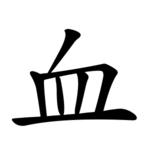Radical 143
Appearance
(Redirected from 血)
| 血 | ||
|---|---|---|
| ||
| 血 (U+8840) "blood" | ||
| Pronunciations | ||
| Pinyin: | xuè | |
| Bopomofo: | ㄒㄩㄝˋ | |
| Wade–Giles: | hsüeh4 | |
| Cantonese Yale: | hyut3 | |
| Jyutping: | hyut3 | |
| Japanese Kana: | ケツ ketsu / ケチ kechi (on'yomi) ち chi (kun'yomi) | |
| Sino-Korean: | 혈 hyeol | |
| Names | ||
| Japanese name(s): | 血/ち chi (Left) 血偏/ちへん chihen | |
| Hangul: | 피 pi | |
| Stroke order animation | ||
 | ||
Radical 143 or radical blood (血部) meaning "blood" is one of the 29 Kangxi radicals (214 radicals in total) composed of 6 strokes.
In the Kangxi Dictionary, there are 60 characters (out of 49,030) to be found under this radical.
血 is also the 138th indexing component in the Table of Indexing Chinese Character Components predominantly adopted by Simplified Chinese dictionaries published in mainland China.
Evolution
[edit]-
Oracle bone script character
-
Large seal script character
-
Small seal script character
Derived characters
[edit]| Strokes | Characters |
|---|---|
| +0 | 血 |
| +3 | 衁 衂 (=衄) |
| +4 | 衃 衄 |
| +5 | 衅SC (=釁 -> 酉) |
| +6 | 衆JP/KO/GB TC (=眾 -> 目) 衇 (=脈 -> 肉) 衈 衉 |
| +15 | 衊 |
| +18 | 衋 |
Sinogram
[edit]As an independent sinogram it is one of the kyōiku kanji or kanji taught in elementary school in Japan.[1] It is a third grade kanji.[1]
References
[edit]- ^ a b "The Kyoiku Kanji (教育漢字) - Kanshudo". www.kanshudo.com. Archived from the original on March 24, 2022. Retrieved 2023-05-06.
Further reading
[edit]- Fazzioli, Edoardo (1987). Chinese calligraphy : from pictograph to ideogram : the history of 214 essential Chinese/Japanese characters. calligraphy by Rebecca Hon Ko. New York: Abbeville Press. ISBN 0-89659-774-1.
External links
[edit]Wikimedia Commons has media related to Radical 143.



